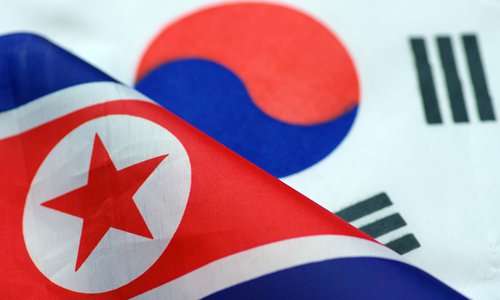HOME >> WORLD
S. Korea to seek virtuous cycle of improved inter-Korean ties, DPRK-US denuke talks
Source:Xinhua Published: 2019/10/30 17:37:21

Photo: VCG
South Korea will continue to seek a virtuous cycle of improved inter-Korean relations that help advance the denuclearization negotiations between the Democratic People's Republic of Korea (DPRK) and the United States, a unification ministry official of South Korea said Wednesday.
The senior official at Seoul's unification ministry in charge of inter-Korean affairs, who declined to be identified, said the government still had a strong willingness toward the virtuous cycle, advocated by South Korean President Moon Jae-in to let the enhanced inter-Korean ties have a positive influence on the DPRK-US denuclearization talks.
He said the inter-Korean relations and the DPRK-US dialogue should not necessarily coincide, in terms of the speed of advance, as the temporary speed difference can create a positive effect during the process of the virtuous cycle.
For the virtuous cycle, South Korea has been making various efforts currently, the official said.
Seoul offered Monday to hold working-level talks with Pyongyang about issues on the suspended Mount Kumgang tour project. The following day, the DPRK said it preferred the exchange of letters, rather than face-to-face talks.
The DPRK's official newspaper Rodong Sinmun reported last week that top DPRK leader Kim Jong Un said he would welcome the South Korean compatriots at any time if they want to come to Mount Kumgang.
Kim ordered the removal of South Korea-built "shabby" facilities in Mount Kumgang in an agreement with the relevant unit of the South Korean side.
The tour by South Koreans to Mount Kumgang, launched in 1998, has been suspended since a South Korean female tourist was shot dead in 2008 by a DPRK soldier after allegedly venturing into off-limit areas.
After the DPRK leader's order, South Korean Foreign Minister Kang Kyung-wha said the individual tour by the South Korean people to the Mount Kumgang resort was not basically subject to the UN Security Council sanctions.
However, the resumed tour by South Koreans could be subject to the international sanctions if the travel costs are paid to the DPRK side in "bulk cash."
Seoul's unification ministry said it would seek "creative" ways to resolve the Mount Kumgang issues considering the international situation, inter-Korean relations progress and public sentiment.
The current leaders of the two Koreas agreed during their third summit in Pyongyang last September to restart the Mount Kumgang tour program when conditions are met.
The unification ministry official said a smooth progress should be made in relations among the parties concerned, including the two Koreas and the United States, in addition to the international society's cooperation in order to deal with the Korean Peninsula's denuclearization.
The Seoul official said that South Korea has also been pushing for humanitarian aid to the DPRK as part of efforts for the improved inter-Korean relations that are anticipated to have a positive effect on the DPRK-US ties.
Earlier this year, South Korea offered to provide 50,000 tons of rice to the DPRK through the World Food Program (WFP), but the DPRK rejected it citing the combined annual military exercises between Seoul and Washington.
Seoul separately approved a plan in June to donate 8 million US dollars to the WFP and the UN children's fund (UNICEF) for food assistance to babies and pregnant women in the DPRK.
Posted in: ASIA-PACIFIC